Unit 3 Lesson 7 Chinese New Year 课件(33张PPT)
文档属性
| 名称 | Unit 3 Lesson 7 Chinese New Year 课件(33张PPT) | 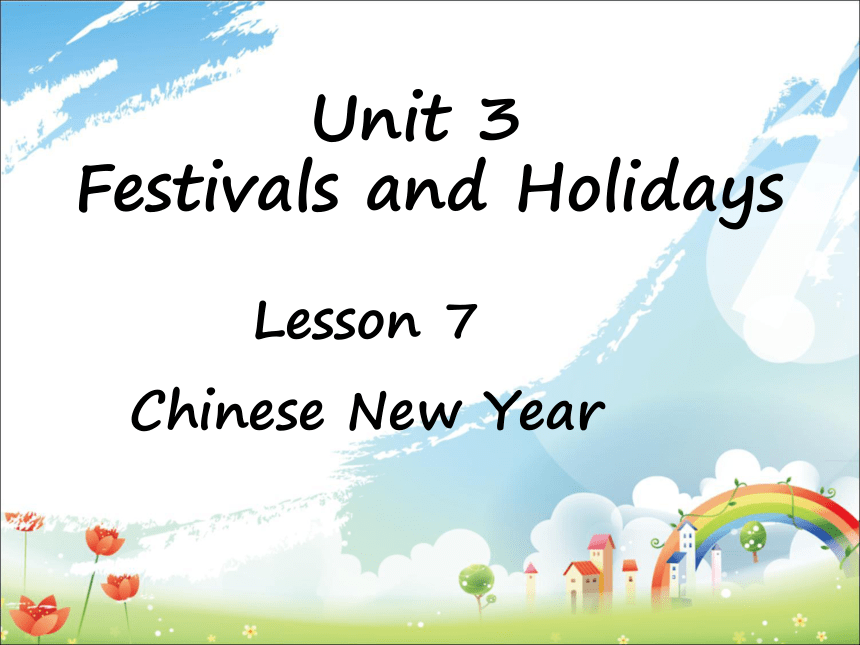 | |
| 格式 | ppt | ||
| 文件大小 | 1.9MB | ||
| 资源类型 | 教案 | ||
| 版本资源 | 北师大版 | ||
| 科目 | 英语 | ||
| 更新时间 | 2022-06-15 17:37:48 | ||
图片预览

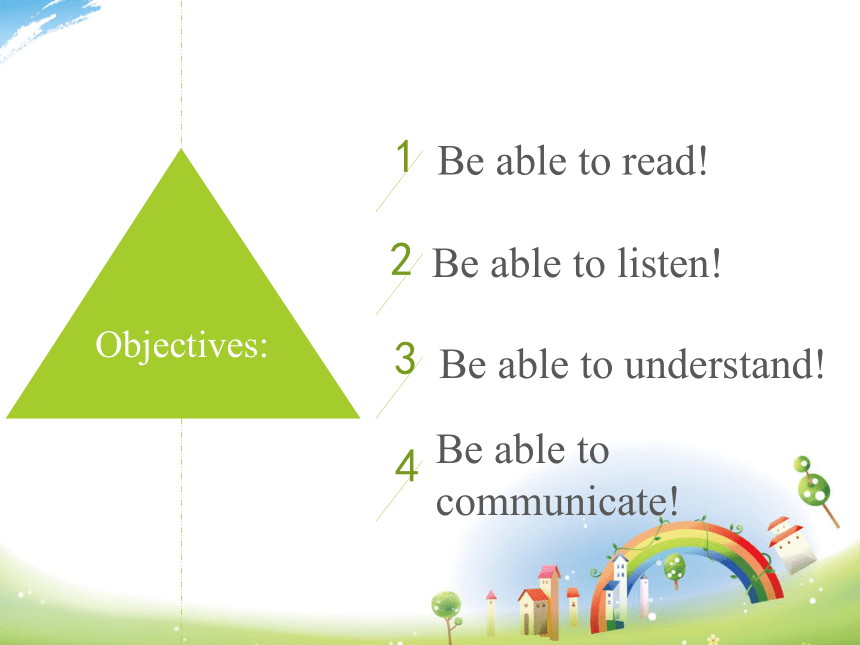

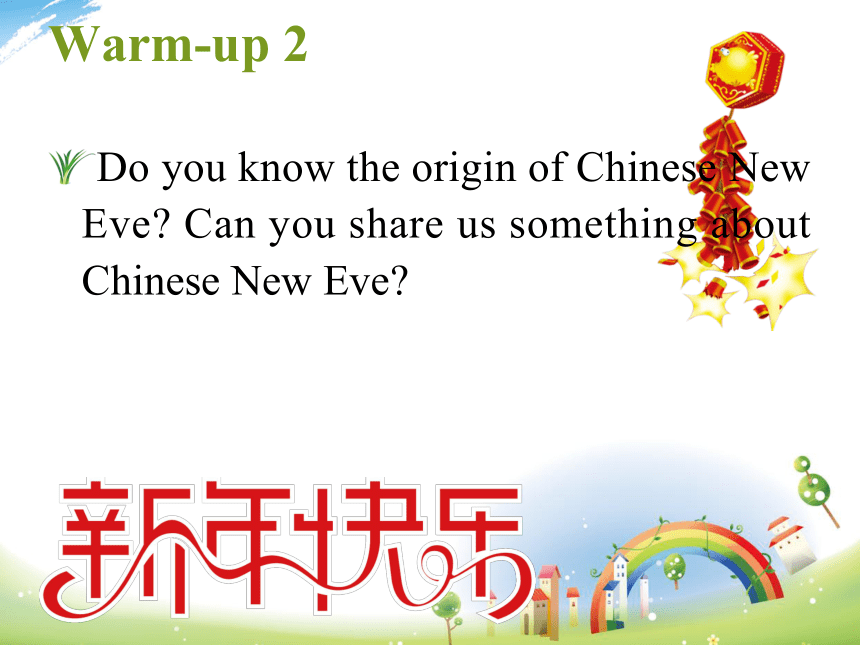
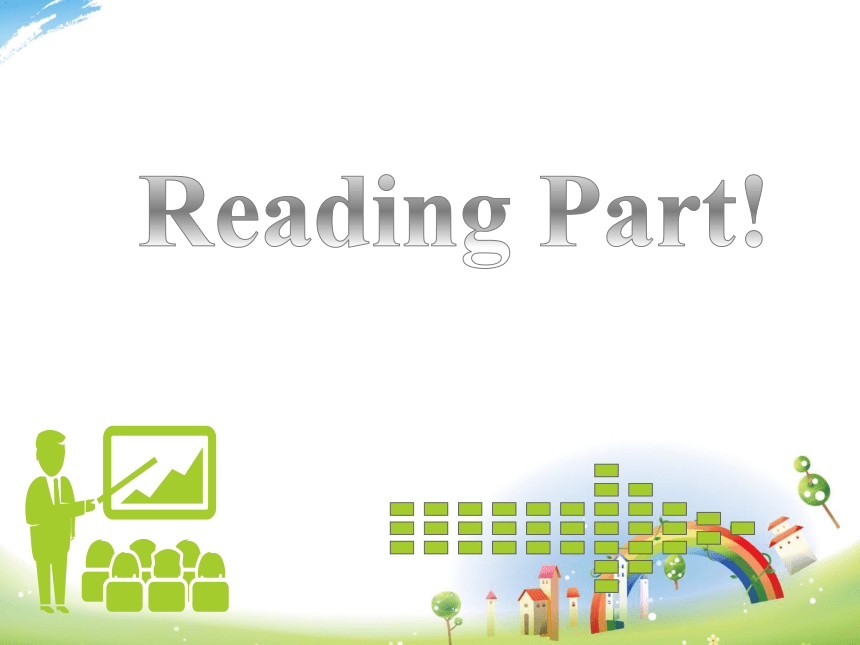
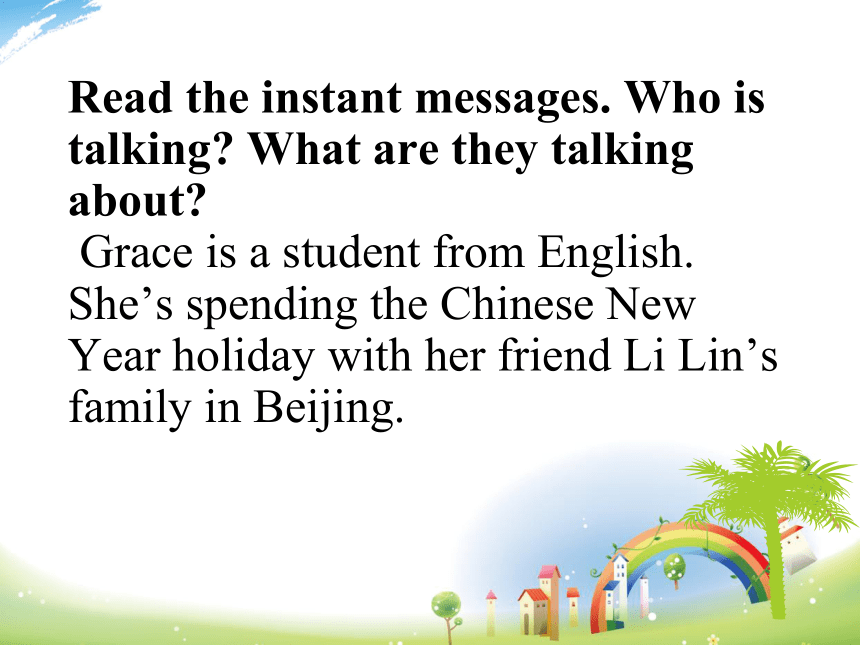
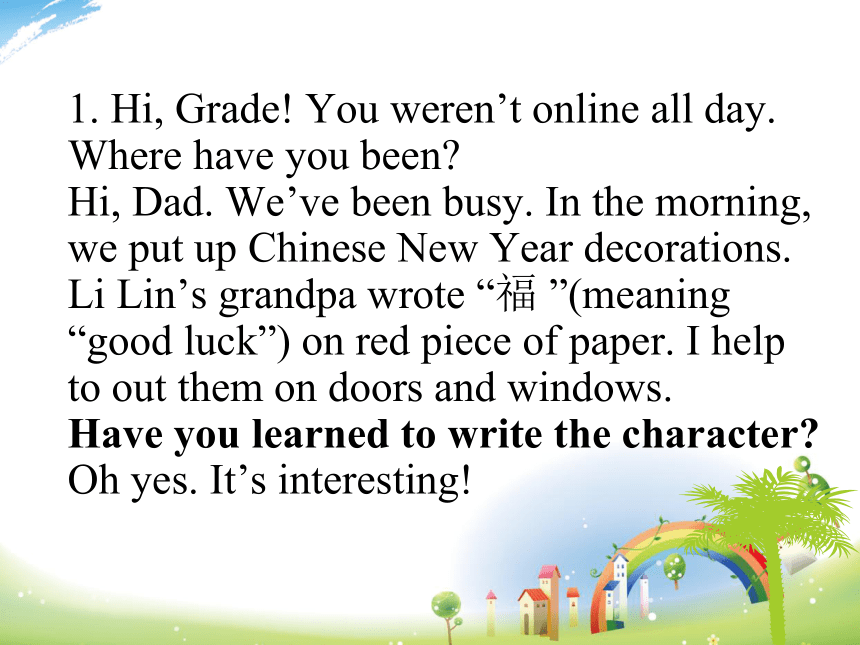

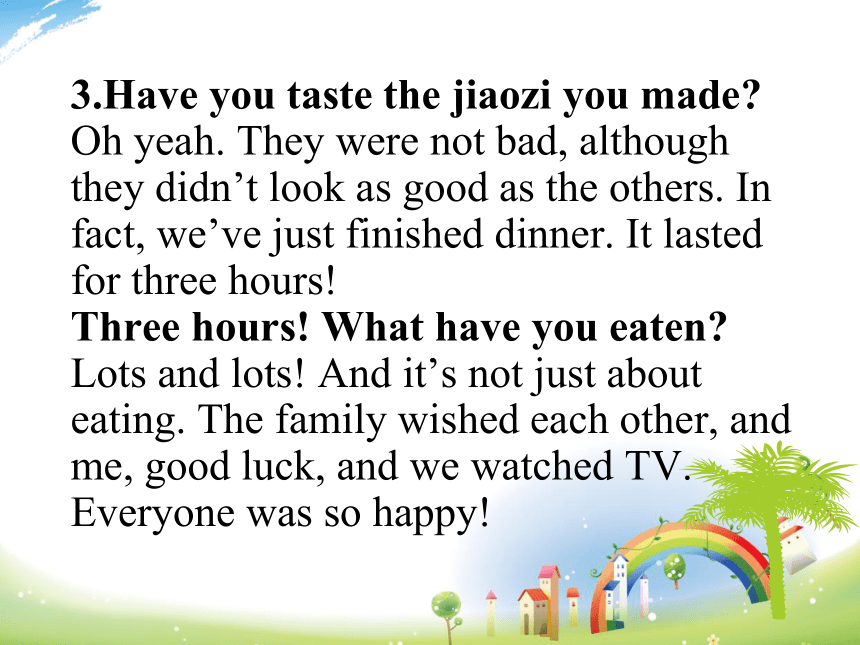



文档简介
(共33张PPT)
Lesson 7
Chinese New Year
Unit 3
Festivals and Holidays
Objectives:
Be able to read!
1
Be able to listen!
2
Be able to communicate!
3
Be able to understand!
4
Warm-up 1
What do you and your family do on Chinese New Year’s Eve
Example
We have a bid family dinner on Chinese New Year’s Eve.
Warm-up 2
Do you know the origin of Chinese New Eve Can you share us something about Chinese New Eve
Read the instant messages. Who is talking What are they talking about
Grace is a student from English. She’s spending the Chinese New Year holiday with her friend Li Lin’s family in Beijing.
1. Hi, Grade! You weren’t online all day. Where have you been
Hi, Dad. We’ve been busy. In the morning, we put up Chinese New Year decorations. Li Lin’s grandpa wrote “福 ”(meaning “good luck”) on red piece of paper. I help to out them on doors and windows.
Have you learned to write the character
Oh yes. It’s interesting!
2.Then in the afternoon. I help Li Lin’s family prepare the Chinese New Year dinner. It’s like our Christmas dinner.
What have you prepared
We’ve prepared fish, tofu, fried meat balls, etc. Every dish has its meaning like peace, good luck, good health…and I’ve learned to make jiaozi!
3.Have you taste the jiaozi you made
Oh yeah. They were not bad, although they didn’t look as good as the others. In fact, we’ve just finished dinner. It lasted for three hours!
Three hours! What have you eaten
Lots and lots! And it’s not just about eating. The family wished each other, and me, good luck, and we watched TV. Everyone was so happy!
4.The best thing about Chinese New Year is fireworks. Just before midnight, everyone went outside and millions of firework went off together. The sky suddenly became bright and everybody cheered. It was very exciting.
Have you taken any photos
Oh, yes, I have. Lots of them…
格蕾丝是来自英国的一名学生。她正在北京和她的朋友一起过新年假日呢。
Chinese version:
1. 嗨,格雷德!你整天都不在线。你去哪了?
嗨,爸爸,我们正在忙。上午,我们在为新年张贴一些装饰。李琳的爷爷在红色的纸上写了“福”字(意味着“好运”)。我帮他们把这些贴到门上和窗上。
你学会写这个汉字了吗?
哦,是的,很有趣!
2.然后下午,我帮助李琳家人准备年夜饭。那就像我们圣诞节晚安一样。
你们准备了什么?
我们准备了鱼,豆腐,煎炸肉圆等。每盘菜都有自己的寓意,比如和平,好运,身体健康等…而且我学会了包饺子。
3.你吃了自己包的饺子吗?
当然,它们还不错,尽管看起来不像其他门那样好看。事实上,我们刚吃完晚餐,持续了三个小时。
三个小时!你们吃什么呢?
很多很多!并不只是吃。家人们祝愿了每个人好运,包括我。我们还看了电视。每个人都特别高兴。
4.中国新年最有趣的就是烟花呢。午夜之前的时刻,每个人都走出家门,成千上万的的烟花同时点燃。天空突然变得明亮,每个人都在庆祝。很激动人心。
你拍了照片吗?
哦,当然,我拍了很多。
Listen to the tape, and check your answer from above. Then read aloud the text!
Check our answers in pairs and talk with you partners.
Grammar Part!
现在完成时(the Perfect Past Tense)
1.表示从过去某一事件发生到现在或将继续持续下去
2.过去发生的事对现在造成的影响
3.表示现在已经完成的动作
4.构成 主语+have/has +动词的过去分词.
现在完成时(the Perfect Past Tense)
基本结构:主语+have/has+动词的过去分词(p.p)
①肯定句:主语+have/has+动词的过去分词(p.p)(V-ed)+宾语(或者其他).
②否定句:主语+have not/has not+动词的过去分词(p.p)(V-ed)+宾语.
现在完成时(the Perfect Past Tense)
基本结构:主语+have/has+动词的过去分词(p.p)
③一般疑问句:Have/Has+主语+动词的过去分词(p.p)(V-ed)+宾语(或者其他)
④特殊疑问句:特殊疑问词+一般疑问句(have/has+主语+过去分词+其他)
现在完成时(the Perfect Past Tense)
用法要点
1.现在完成时不能单独与准确时间状语连用,(如表示过去的时间状语)
如yesterday(morning、afternoon),
last(morning、afternoon)等,除非与for,since连用.
现在完成时(the Perfect Past Tense)
2.现在完成时往往同表示不确定的过去时间状语连用
如already(肯定句中),yet(否定,疑问,句末),just, before, recently, still, lately, never等:
He has already obtained a scholarship.他已经获得了一份奖学金。
I haven‘t seen much of him recently (lately).我已经很久没有看到他。
现在完成时(the Perfect Past Tense)
3. 现在完成时态经常与表示频度的时间状语连用,
如often, sometimes, ever, never, twice,
on several occasion等:
Have you ever been to Beijing
你以前去过北京吗?
I have used this pen only three times. It is still good.这支钢笔我只用过三次。它仍然是好的。
现在完成时(the Perfect Past Tense)
4. 现在完成时还往往可以同包括现在时间在内的时间状语连用如 up to these
few days/weeks/months/years,
This morning/week/month/year, up to present, so far等:Man has now learned to release energy from the nucleus of the atom.人们现在已经学会了从原子核中释放能量。
There has been too much rain in San Francisco this year.今年以来旧金山雨水太多。
现在完成时(the Perfect Past Tense)
5.现在完成时还可以用来表示过去的一个时间到现在这段时间内重复发生的动作.
6.现在完成时的"完成用法"指的是动作发生在过去某一时刻并已结束。
例如:He has turned the light off .他已把灯关了。
一般过去时与现在完成时之比较
1)一般过去时表示过去某时发生的动作或单纯叙述过去的事情,强调动作,和现在不发生关系。而现在完成时表示过去发生的某一动作对现在造成的影响或结果,强调的是现在的情况。
2)一般过去时常与具体的时间状语连用,而现在完成时通常与模糊的时间状语连用,或无时间状语。
一般过去时与现在完成时之比较
◎ 一般过去时的时间状语有:yesterday, last week,…ago, in1980, in October, just now,等具体的时间状语。
◎ 共同的时间状语有:this morning, tonight, this summer, before, already,等。
◎ 现在完成时的时间状语有:for, since, ever, never, just, already, yet, in past years等不确定的时间状语。
Speaking Part!
Have you ever done the things below. Ask your partner.
Cook Chinese New Year dinner make jiaozi
Set off fireworks
Bug flower at a market
Send text messages to friends
Speaking Part!
Example
A: Have you ever made jiaozi
B: Yes, I have.
A: Have you ever set off fireworks
B: No, I haven’t.
Make conversations with your partners!
与你的同伴练习以上对话!
请课后认真复习本单元语法内容,并朗诵课文对话!
Lesson 7
Chinese New Year
Unit 3
Festivals and Holidays
Objectives:
Be able to read!
1
Be able to listen!
2
Be able to communicate!
3
Be able to understand!
4
Warm-up 1
What do you and your family do on Chinese New Year’s Eve
Example
We have a bid family dinner on Chinese New Year’s Eve.
Warm-up 2
Do you know the origin of Chinese New Eve Can you share us something about Chinese New Eve
Read the instant messages. Who is talking What are they talking about
Grace is a student from English. She’s spending the Chinese New Year holiday with her friend Li Lin’s family in Beijing.
1. Hi, Grade! You weren’t online all day. Where have you been
Hi, Dad. We’ve been busy. In the morning, we put up Chinese New Year decorations. Li Lin’s grandpa wrote “福 ”(meaning “good luck”) on red piece of paper. I help to out them on doors and windows.
Have you learned to write the character
Oh yes. It’s interesting!
2.Then in the afternoon. I help Li Lin’s family prepare the Chinese New Year dinner. It’s like our Christmas dinner.
What have you prepared
We’ve prepared fish, tofu, fried meat balls, etc. Every dish has its meaning like peace, good luck, good health…and I’ve learned to make jiaozi!
3.Have you taste the jiaozi you made
Oh yeah. They were not bad, although they didn’t look as good as the others. In fact, we’ve just finished dinner. It lasted for three hours!
Three hours! What have you eaten
Lots and lots! And it’s not just about eating. The family wished each other, and me, good luck, and we watched TV. Everyone was so happy!
4.The best thing about Chinese New Year is fireworks. Just before midnight, everyone went outside and millions of firework went off together. The sky suddenly became bright and everybody cheered. It was very exciting.
Have you taken any photos
Oh, yes, I have. Lots of them…
格蕾丝是来自英国的一名学生。她正在北京和她的朋友一起过新年假日呢。
Chinese version:
1. 嗨,格雷德!你整天都不在线。你去哪了?
嗨,爸爸,我们正在忙。上午,我们在为新年张贴一些装饰。李琳的爷爷在红色的纸上写了“福”字(意味着“好运”)。我帮他们把这些贴到门上和窗上。
你学会写这个汉字了吗?
哦,是的,很有趣!
2.然后下午,我帮助李琳家人准备年夜饭。那就像我们圣诞节晚安一样。
你们准备了什么?
我们准备了鱼,豆腐,煎炸肉圆等。每盘菜都有自己的寓意,比如和平,好运,身体健康等…而且我学会了包饺子。
3.你吃了自己包的饺子吗?
当然,它们还不错,尽管看起来不像其他门那样好看。事实上,我们刚吃完晚餐,持续了三个小时。
三个小时!你们吃什么呢?
很多很多!并不只是吃。家人们祝愿了每个人好运,包括我。我们还看了电视。每个人都特别高兴。
4.中国新年最有趣的就是烟花呢。午夜之前的时刻,每个人都走出家门,成千上万的的烟花同时点燃。天空突然变得明亮,每个人都在庆祝。很激动人心。
你拍了照片吗?
哦,当然,我拍了很多。
Listen to the tape, and check your answer from above. Then read aloud the text!
Check our answers in pairs and talk with you partners.
Grammar Part!
现在完成时(the Perfect Past Tense)
1.表示从过去某一事件发生到现在或将继续持续下去
2.过去发生的事对现在造成的影响
3.表示现在已经完成的动作
4.构成 主语+have/has +动词的过去分词.
现在完成时(the Perfect Past Tense)
基本结构:主语+have/has+动词的过去分词(p.p)
①肯定句:主语+have/has+动词的过去分词(p.p)(V-ed)+宾语(或者其他).
②否定句:主语+have not/has not+动词的过去分词(p.p)(V-ed)+宾语.
现在完成时(the Perfect Past Tense)
基本结构:主语+have/has+动词的过去分词(p.p)
③一般疑问句:Have/Has+主语+动词的过去分词(p.p)(V-ed)+宾语(或者其他)
④特殊疑问句:特殊疑问词+一般疑问句(have/has+主语+过去分词+其他)
现在完成时(the Perfect Past Tense)
用法要点
1.现在完成时不能单独与准确时间状语连用,(如表示过去的时间状语)
如yesterday(morning、afternoon),
last(morning、afternoon)等,除非与for,since连用.
现在完成时(the Perfect Past Tense)
2.现在完成时往往同表示不确定的过去时间状语连用
如already(肯定句中),yet(否定,疑问,句末),just, before, recently, still, lately, never等:
He has already obtained a scholarship.他已经获得了一份奖学金。
I haven‘t seen much of him recently (lately).我已经很久没有看到他。
现在完成时(the Perfect Past Tense)
3. 现在完成时态经常与表示频度的时间状语连用,
如often, sometimes, ever, never, twice,
on several occasion等:
Have you ever been to Beijing
你以前去过北京吗?
I have used this pen only three times. It is still good.这支钢笔我只用过三次。它仍然是好的。
现在完成时(the Perfect Past Tense)
4. 现在完成时还往往可以同包括现在时间在内的时间状语连用如 up to these
few days/weeks/months/years,
This morning/week/month/year, up to present, so far等:Man has now learned to release energy from the nucleus of the atom.人们现在已经学会了从原子核中释放能量。
There has been too much rain in San Francisco this year.今年以来旧金山雨水太多。
现在完成时(the Perfect Past Tense)
5.现在完成时还可以用来表示过去的一个时间到现在这段时间内重复发生的动作.
6.现在完成时的"完成用法"指的是动作发生在过去某一时刻并已结束。
例如:He has turned the light off .他已把灯关了。
一般过去时与现在完成时之比较
1)一般过去时表示过去某时发生的动作或单纯叙述过去的事情,强调动作,和现在不发生关系。而现在完成时表示过去发生的某一动作对现在造成的影响或结果,强调的是现在的情况。
2)一般过去时常与具体的时间状语连用,而现在完成时通常与模糊的时间状语连用,或无时间状语。
一般过去时与现在完成时之比较
◎ 一般过去时的时间状语有:yesterday, last week,…ago, in1980, in October, just now,等具体的时间状语。
◎ 共同的时间状语有:this morning, tonight, this summer, before, already,等。
◎ 现在完成时的时间状语有:for, since, ever, never, just, already, yet, in past years等不确定的时间状语。
Speaking Part!
Have you ever done the things below. Ask your partner.
Cook Chinese New Year dinner make jiaozi
Set off fireworks
Bug flower at a market
Send text messages to friends
Speaking Part!
Example
A: Have you ever made jiaozi
B: Yes, I have.
A: Have you ever set off fireworks
B: No, I haven’t.
Make conversations with your partners!
与你的同伴练习以上对话!
请课后认真复习本单元语法内容,并朗诵课文对话!
同课章节目录
- Unit 1 Technology and the Future
- Lesson 1 Schools of the Future
- Lesson 2 Online Life
- Lesson 3 Tomorrow's Jobs
- Communication Workshop
- Unit 2 Communication
- Lesson 4 Animal Talk
- Lesson 5 Meeting People
- Lesson 6 The Texting Generation
- Communication Workshop
- Unit 3 Festivals and Holidays
- Lesson 7 Chinese New Year
- Lesson 8 A Picnic
- Lesson 9 Thanksgiving
- Communication Workshop
- Unit 4 Dealing with Problems
- Lesson 10 Problem Page
- Lesson 11 Online Time
- Lesson 12 Generation Gap
- Communication Workshop
- Unit 5 Memories
- Lesson 13 A Daughter's Letter
- Lesson 14 Grandpa's Memories
- Lesson 15 Life in the 1950s
- Communication Workshop
- Unit 6 Detectives
- Lesson 16 A Detective Story (I)
- Lesson 17 A Detective Story (II)
- Lesson 18 The Mystery Writer
- Communication Workshop
